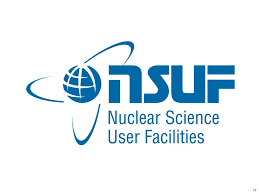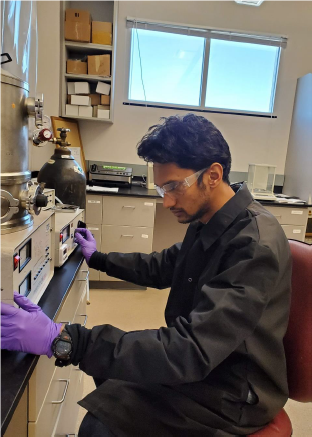ECE doctoral candidate Al-Amin Ahmed Simon was recently granted access to the Nuclear Science User Facilities (NSUF) as part of a Rapid Turnaround Experiment aimed at developing a better temperature sensor.

The NSUF is a program established by the U.S. Department of Energy Office of Nuclear Energy for the purpose of accelerating nuclear power research. Specifically, they seek to understand how radiation affects existing and proposed reactor materials over time. Al-Amin and his collaborators have been developing sensors made for high-radiation environments. His team includes ECE masters student Lyle Jones, Dr. Isabella Van Rooyen from the Idaho National Lab, and Dr. Maria Mitkova, professor of electrical and computer engineering at Boise State.

Al-Amin’s research will provide reliability data about a new type of printed temperature sensor, which utilizes the phase-change property of chalcogenide glass. Ultimately, this research will lead to an improved ability to measure temperatures in storage facilities and experimental reactors
The project proposal, “Performance and Structural Damage Analysis of Chalcogenide Glass Phase Change Temperature Sensors Under Ion Irradiation (19-2852)”, was submitted as part of Al-Amin’s internship at Idaho National Lab, Fuel design and performance department. The grant includes funding for ion irradiation of the devices at Michigan Ion Beam Lab at the University of Michigan and characterization at the Center of Advanced Energy Studies (CAES) in Idaho Falls.
Al-Amin has been part of Nanoionic Devices and Materials Lab (NDML) for the last four years, primarily working on a Department of Energy NEUP funded project “Integrated silicon/chalcogenide glass hybrid plasmonic sensor for monitoring of temperature in nuclear facilities” under the supervision of Drs. Mitkova (ECE), Subbaraman (ECE), and Van Rooyen (INL).
Before joining Boise State, Al-Amin completed a bachelor’s in electrical engineering from Bangladesh University of Engineering & Technology and a master’s in nuclear engineering from the University of Dhaka. Al-Amin has developed a novel inkjet-printed phase-change device with nano-particle ink, which has been presented recently at The Minerals, Metals & Materials Society 2020 conference. He has also worked on developing a space-grade printed radiation sensor for a NASA funded project- “Space-Grade Flexible Hybrid Electronics”.